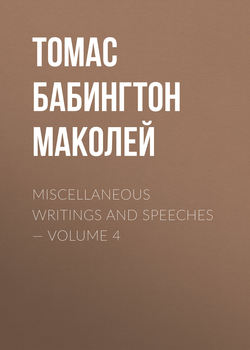Читать книгу Miscellaneous Writings and Speeches — Volume 4 - Т.Б. Маколей, Томас Бабингтон Маколей - Страница 8
SPEECHES, ETC ANATOMY BILL. (FEBRUARY 27, 1832) A SPEECH DELIVERED IN THE HOUSE OF COMMONS ON THE 27TH OF FEBRUARY, 1832
ОглавлениеOn Monday, the twenty-seventh of February, 1832, the House took into consideration the report of the Committee on Mr Warburton's Anatomy Bill. Mr Henry Hunt attacked that bill with great asperity. In reply to him the following Speech was made.
Sir, I cannot, even at this late hour of the night, refrain from saying two or three words. Most of the observations of the honourable Member for Preston I pass by, as undeserving of any answer before an audience like this. But on one part of his speech I must make a few remarks. We are, he says, making a law to benefit the rich, at the expense of the poor. Sir, the fact is the direct reverse. This is a bill which tends especially to the benefit of the poor. What are the evils against which we are attempting to make provision? Two especially; that is to say, the practice of Burking, and bad surgery. Now to both these the poor alone are exposed. What man, in our rank of life, runs the smallest risk of being Burked? That a man has property, that he has connections, that he is likely to be missed and sought for, are circumstances which secure him against the Burker. It is curious to observe the difference between murders of this kind and other murders. An ordinary murder hides the body, and disposes of the property. Bishop and Williams dig holes and bury the property, and expose the body to sale. The more wretched, the more lonely, any human being may be, the more desirable prey is he to these wretches. It is the man, the mere naked man, that they pursue. Again, as to bad surgery; this is, of all evils, the evil by which the rich suffer least, and the poor most. If we could do all that in the opinion of the Member for Preston ought to be done, if we could destroy the English school of anatomy, if we could force every student of medical science to go to the expense of a foreign education, on whom would the bad consequences fall? On the rich? Not at all. As long as there is in France, in Italy, in Germany, a single surgeon of eminent skill, a single surgeon who is, to use the phrase of the member for Preston, addicted to dissection, that surgeon will be in attendance whenever an English nobleman is to be cut for the stone. The higher orders in England will always be able to procure the best medical assistance. Who suffers by the bad state of the Russian school of surgery? The Emperor Nicholas? By no means. The whole evil falls on the peasantry. If the education of a surgeon should become very extensive, if the fees of surgeons should consequently rise, if the supply of regular surgeons should diminish, the sufferers would be, not the rich, but the poor in our country villages, who would again be left to mountebanks, and barbers, and old women, and charms and quack medicines. The honourable gentleman talks of sacrificing the interests of humanity to the interests of science, as if this were a question about the squaring of the circle, or the transit of Venus. This is not a mere question of science: it is not the unprofitable exercise of an ingenious mind: it is a question between health and sickness, between ease and torment, between life and death. Does the honourable gentleman know from what cruel sufferings the improvement of surgical science has rescued our species? I will tell him one story, the first that comes into my head. He may have heard of Leopold, Duke of Austria, the same who imprisoned our Richard Coeur-de-Lion. Leopold's horse fell under him, and crushed his leg. The surgeons said that the limb must be amputated; but none of them knew how to amputate it. Leopold, in his agony, laid a hatchet on his thigh, and ordered his servant to strike with a mallet. The leg was cut off, and the Duke died of the gush of blood. Such was the end of that powerful prince. Why, there is not now a bricklayer who falls from a ladder in England, who cannot obtain surgical assistance, infinitely superior to that which the sovereign of Austria could command in the twelfth century. I think this a bill which tends to the good of the people, and which tends especially to the good of the poor. Therefore I support it. If it is unpopular, I am sorry for it. But I shall cheerfully take my share of its unpopularity. For such, I am convinced, ought to be the conduct of one whose object it is, not to flatter the people, but to serve them.
